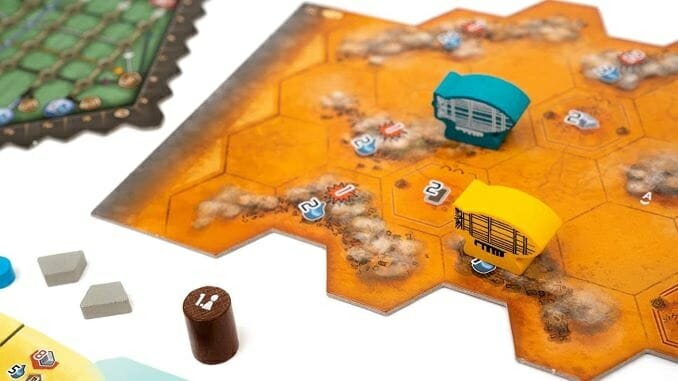
CloudAge, a new semi-legacy game from Alexander Pfister, the designer of games like Great Western Trail, Port Royal, and Broom Service, is a medium-weight game with the setup of a much heavier game. I think that’s going to be an obstacle to get it to the table for new players. The game itself isn’t that complex, and the finite number of turns means once you start playing, it’s not as long as the number of parts and long rule book might lead you to believe.
In CloudAge, players try to gather resources, including the essential one of energy, to build upgrades to their airship that allow them to move more spaces on the map, fight more effectively against the unseen rebels in city spaces, plant more new growth, or just gain more points at game end. Your base movement comes from your deck of movement cards, with every player starting with a set of cards that show movement of 0 to 3 spaces; on every turn, you draw two cards, use the lower number to determine how much energy you get on that turn, and then use the higher one as your base movement amount. Then you move your airship, gaining resources for some of the spaces you traverse, and end in a city, where you can choose to fight the rebels and gain points or perhaps other resources.

The one truly clever bit of CloudAge is in the build phase, where players compete to gain resources from cards that are partially obscured by cloud stickers on the sleeves that hold them. It’s gambling, sort of, but helps flatten things out across players and provide a little intrigue. You might not get the most resources, but you might get an extra build/upgrade action instead, or get the right to trash a movement card from your deck, too.
The box comes with three scenarios you can play on their own and a four-chapter legacy mode where you’ll build up the map by placing new hex tiles that add resources. There’s also a simple solo mode that takes advantage of the fact that the regular game has almost no player interaction—you fight the rebels, but not each other—by sending you through seven normal turns and getting you a few extra resources that you would have gotten from other players’ build phases. I was legit angry after the long setup, but after I played the game once, I realized how much better it works than I expected. If you like Pfister’s heavier games, or want a legacy title that won’t take 12 or more plays while also offering a good standalone option, this is for you.
Capstone also recently released the game Juicy Fruits, which I have also reviewed for Paste.
Keith Law is the author of The Inside Game and Smart Baseball and a senior baseball writer for The Athletic. You can find his personal blog the dish, covering games, literature, and more, at meadowparty.com/blog.